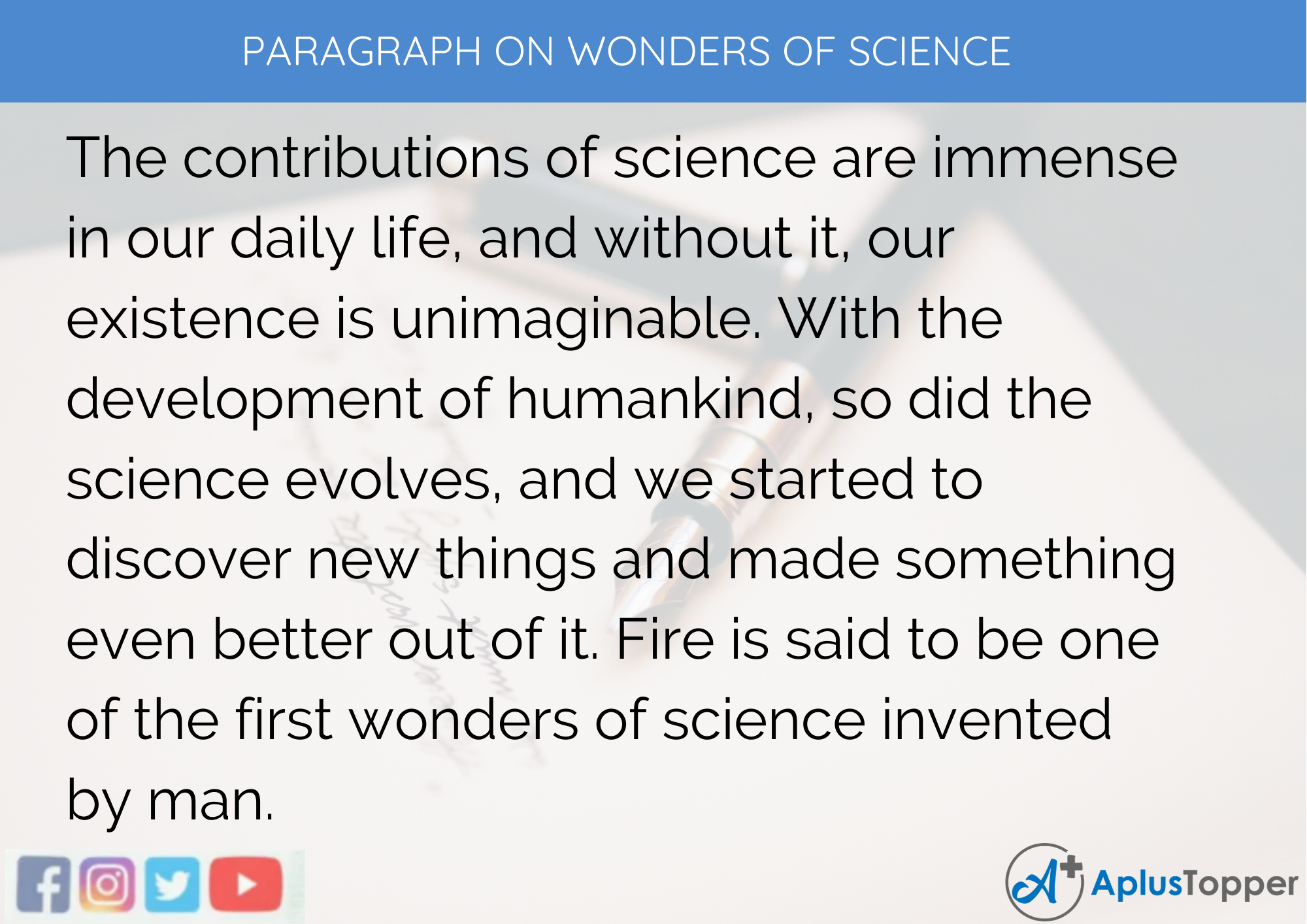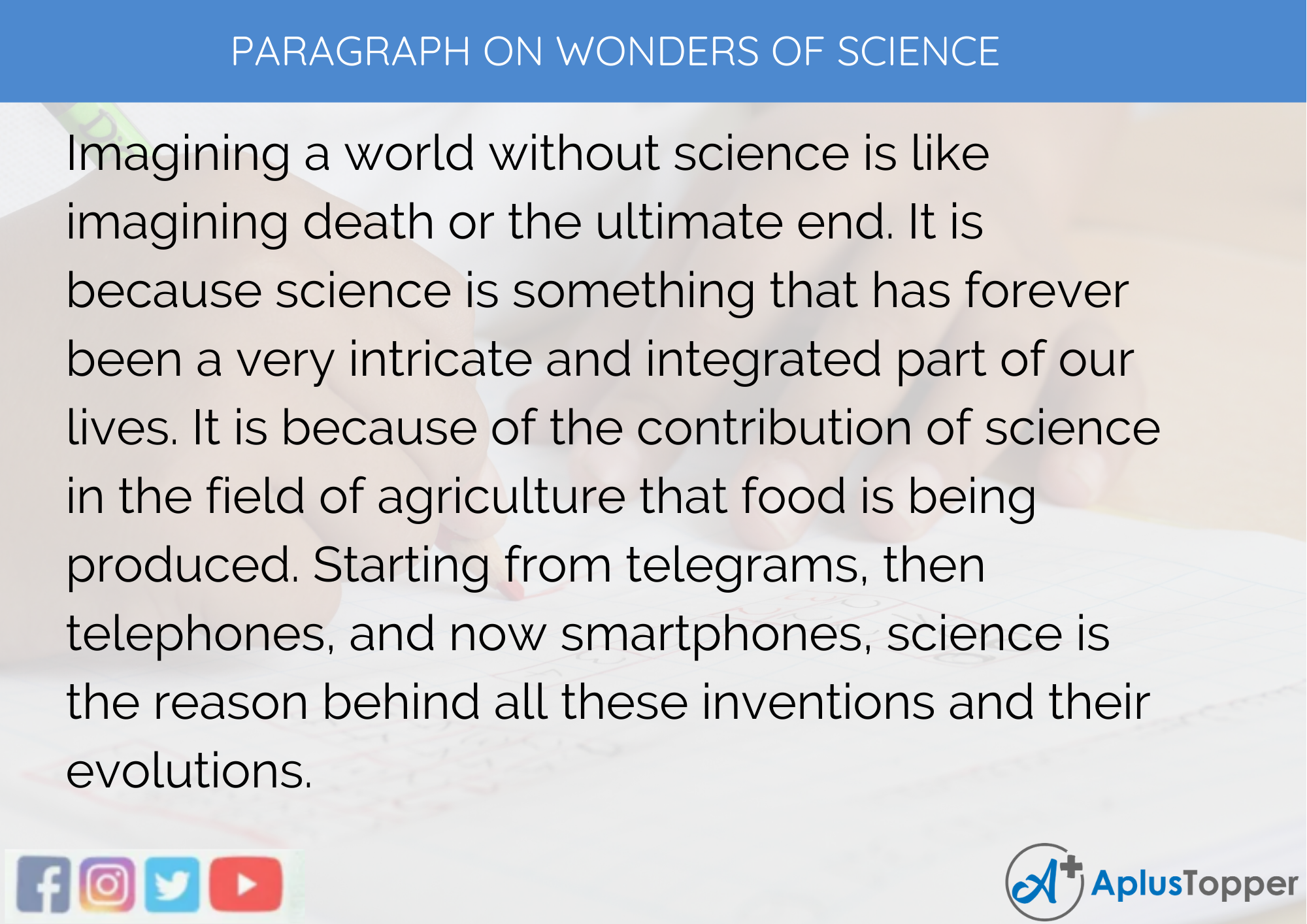Wonder Of Modern Science Paragraph: Science is nothing indifferent to existence itself. It is us who started investigating every aspect of life to find the mystery behind it, and describe it. All this is part of science. From the moment we wake up and till when we all go to sleep, our entirety revolves around science.
You can read more Paragraph Writing about articles, events, people, sports, technology many more.
Wonder Of Modern Science Paragraph For 1, 2, 3, 4, 5, 6, 7, 8, 9, 10, 11 And 12 Students
Paragraph On Wonders Of Science – 100 Words For Classes 1, 2, 3 Kids
The contributions of science are immense in our daily life, and without it, our existence is unimaginable. With the development of humankind, so did the science evolves, and we started to discover new things and made something even better out of it. Fire is said to be one of the first wonders of science invented by man. The logic was forever within us as a more superior species, and we just started applying it to create things that could make our lives easier. The wonder of science is present and used in all fields of studies. And as responsible people, we must use science and its applications wisely.

Paragraph On Wonders Of Science – 150 Words For Classes 4, 5 Children
One of the biggest blessings of nature and life that every one of us relies on for our survival is science. The motive behind inventions that we can address as the wonders of science is to make the activities involved in our livelihood easier. Our thirst for knowledge often called curiosity, is the drive behind all the discoveries in science ever made. And with this curiosity, imagination, logic, and work, we have been successful as humans to bring forth the wonders of science.
These wonders of science simplify our life but also successfully add meaning to it. From the discoveries made by diving underwater and to the ones made on the ground of Moon, everything explains how far we have come with science at this modern-day age. Food, electricity, transportation, medicines, distance communication, entertainment, internet, or even a pen; you name it, and you will realize all these are wonders of science.
Paragraph On Wonders Of Science – 200 Words For Classes 6, 7, 8 Students
Science began the moment humans learned to use common sense, even if it was a cave person. But when we look at the wonders of science made until now, we will see both sides of the coin. Science is both a blessing and a bane for us, but this depends on how we decide to use it.
Science might have made our life easier by being a boon, but we are the ones who turn the discoveries of science into bane because of our greed. The advantages of science will certainly outnumber the disadvantages, and the elemental proof of that is a livable world. Science was the driving force behind evolution, and this might be one of the biggest wonders of science. The contribution of science in every field begins by observation and then experimentation, which ultimately results in a new invention.
Science has, from the beginning, helped us overcome darkness by bringing light as well as discover the reason behind the existence of darkness simultaneously. But whenever science was used for morally wrong purposes, it always left adverse effects on us in one way or another. Hence, to be civilized means also using the wonders of science for the benefit of humankind.
Paragraph On Wonders Of Science – 250 to 300 Words For Classes 9, 10, 11, 12 And Competitive Exams Students
Imagining a world without science is like imagining death or the ultimate end. It is because science is something that has forever been a very intricate and integrated part of our lives. It is because of the contribution of science in the field of agriculture that food is being produced. Starting from telegrams, then telephones, and now smartphones, science is the reason behind all these inventions and their evolutions.
When human imagination can be brought into reality for physical use, it is called invention, possibly because of science. One such great invention that impacted us as much as once the discovery or creation of fire did is the invention of electricity. The discovery of electricity opened several doors to other scientific inventions that only meant making survival even easier. The discovery of the different types of energy also meant the evolution of our transportation systems to the most efficient for us at present.
Troubles and hardships have always helped people to come up with solutions using science, whether knowingly or unknowingly. With science, we have discovered ways to satisfy our needs and wants even in the absence of the real things that we require. That means science has, in a way, also introduced artificialness into our lives so that we are not deprived of the things we need and want.
Another wonder of science was to help people evolve and become more open-minded by almost diminishing superstitions, ultimately, with all the exploration, discoveries, and inventions. But equally, some of these wonders of sciences were used in destructive purposes rather than concentrating on using them solely for the betterment of humankind.

Frequently Asked Questions On Wonders Of Science
Question 1.
Point out some of the advantages of science.
Answer:
Some advantages that science has created for us are several discoveries in physics, chemistry, biology, maths, natural sciences, geography, astronomy, etc. Science has also provided us with new work opportunities. Effectiveness, communication, understanding, etc. are all enhanced because of science.
Question 2.
Point out some of the disadvantages or boons of science.
Answer:
Science undoubtedly has provided us with several blessings, but also it is because of science that boons like laziness, diseases, pollution, unemployment, etc. exist on this Earth.
Question 3.
Is there a motto of science?
Answer:
There is no fixed motto of science, but we can say that science should be used for simplifying problems or complexities of our life.
Question 4.
Can you define science in a nutshell?
Answer:
Science can be defined as the pursuit of exploration and application of information gathered from nature and society, by following a systematic process based on evidence.
